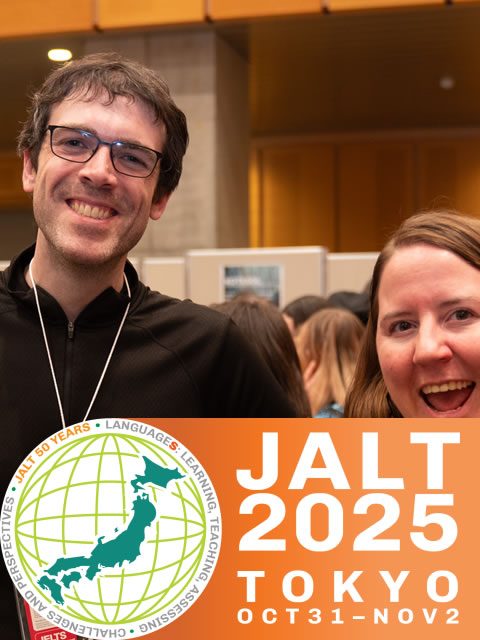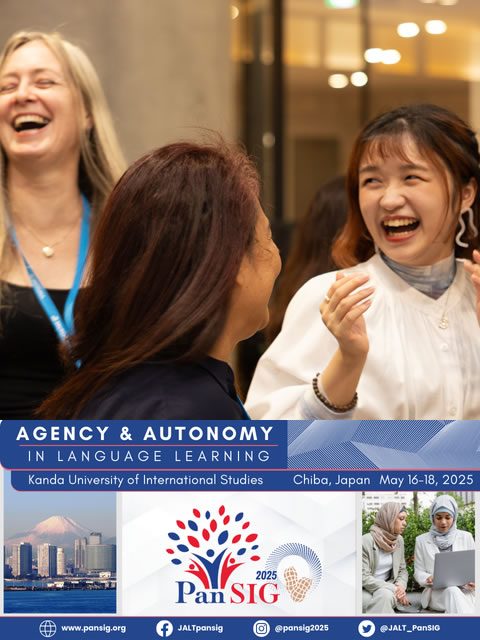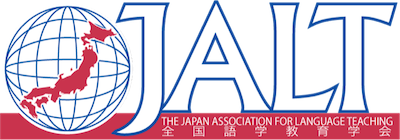Your cart is currently empty!
JALT 2020 Professional Development Workshops (PD) Workshops
•
Friday, 20 November, 1:30 PM – 7:00 PM
JALT2020 will be offering a series of online Professional Development Workshops (PD) in addition to the online Technology in Teaching (TnT) workshops.
This is the second year for these professional development workshops that were inspired by the College and University Educators Special Interest Group (CUE SIG) model implemented for their 2019 conference. Similar to last year, a stimulating range of online professional development opportunities will be available for the JALT2020 Friday sessions.
Would you like to learn more about, for example, data analysis, design thinking, presentation skills, reflective practice, teacher training, community-building, classroom games, or speaking tasks? These academic research and classroom practice topics offer educators a great reason to make Friday a full day of learning and professional growth.
All of these professional development workshops are at absolutely no extra charge. They are included in the one-time, one-price registration fee for this conference. Mix and match your tailored schedule of both TnT and PD workshops. We look forward to seeing you online!
JALT2020 Professional Development Workshops Schedule
Live Zoom Sessions
1st Session(1:30 – 3:00 PM)
2nd Session (3:30 – 5:00 PM)
3rd Session (5:30 – 7:00 PM)
Paul CollettGraphical data analysis1:30 PM – 2:15 PM
Adrianne Verla Uchida, Jennie Roloff Rothman
Engaging in effective reflective practice
Eucharia Donnery, Chhayankdhar Singh Rathore
Omotenashi: Starts with community-building
Rab PatersonPresent like a pro
Eri Kondo
Task interpretations and completions
Sarah Warfield
Speaking tasks in the EFL Classroom
Graphical data analysis
Paul Collett
Graphical visualisation of data can play a key part in research. Following the data collection stage, one of the first steps in a research project should be an exploration of the data to check assumptions, and identify possible patterns or trends. Here, alongside the appropriate descriptive statistics, plotting data in different ways can be very informative. In this workshop we will focus mainly on the initial exploratory stage of a research project. We will look at how to generate and interpret a number of different plots and diagrams using the R statistical package, with an emphasis on the ggplot2 package. The techniques covered can also be applied in the later stages of research when preparing print-ready materials or presentation slides. We will look at graphing and plotting solutions for both numerical data and text corpora to demonstrate techniques applicable to a variety of research situations. No experience with R necessary.
Paul Collett is an instructor at Shimonoseki City University. His background is in research methodology and epistemology. He has done numerous presentations and workshops at international conferences, and had papers published in a number of publications.
Present like a pro
Rab Paterson
No matter where people work, there is a good chance they will be asked to give a presentation at some point. For academics/teachers, they are expected to present their research at conferences and while most are very knowledgeable in their subject areas, many have had little formal training in modern presentations. Therefore, many academics present in a way that is counterproductive to the aim of presentations, i.e. the accurate and efficient transmission of concepts, ideas, and information in a way that enables the audience to retain the content of the presentation afterwards. This session aims to address this issue by looking at the five pillars of presentations-Advance Planning, Appropriate Content, Advantageous Structure, Amazing Design, and then finish with Awesome Delivery – these are what I call the 5A’s of professional presenting. After this session, attendees should see a major difference in how audiences react to their presentations.
Rab Paterson (BA Hons., MA, CoETaIL, MS, Med, FRAS, FRSA) is the Principal Instructor at Toyo University’s Center for Global Education, and Director of the Asia Association for Global Studies. He’s also an Apple Distinguished Educator, Apple Certified Teacher, Google Innovator, Google Certified Trainer, and Google GEG Leader. Rab has given over 200 presentations for many organisations including Keynote, Plenary, Featured Speaker, Invited Speaker, Guest Speaker, and Poster presentations and two TEDx talks.
Engaging in effective reflective practice
Adrianne Verla Uchida and Jennie Roloff Rothman
Reflective practice (RP) is one of the most effective forms of teacher development as it helps educators understand both what they are doing and why they are doing it. However, for it to be useful, RP must be systematic (Farrell, 2019). The presenters, who are experienced reflective practitioners, will briefly introduce the principles of RP before leading participants through a guided RP session. The workshop will conclude with the presenters sharing other ways to engage in RP so that participants leave with ideas for how to implement it for their professional development. Our hope is that the experience of having reflected on their own teaching with others will motivate them to continue engaging in such practices in their own contexts. The presentation will be in English, but participants are welcome to engage in RP in any language during the guided session.
Adrianne Verla Uchida is an Assistant Professor at Nihon University. She earned her MA TESOL from Teachers College, Columbia University. Her research interests include reflective practice, curriculum development, and language learning psychology.Jennie Roloff Rothman is Principal Lecturer of Professional Development-Teacher Development at Kanda University of International Studies. Her MA TESOL is from Teachers College, Columbia University. Her research interests include faculty development, teacher development, critical thinking and global issues in the language classroom.
Task interpretations and completions
Eri Kondo
TBLT (Long, 2015) proposes the learning of tasks as learner-centeredness. The focus is on mental grammar as acquired language. This method would advance the ability of language production in speaking and writing (e.g. Byrnes and Manchon, 2014), however TBLT literature also indicates that learners can have difficulty in interpreting and completing tasks due to individual differences in character or personality. This workshop introduces the idea that the methodology of a task requires task repetition, testing, and instruction as post-tasks for acquiring form and meaning. If language production is reliant on a learner’s long-term memory, then, for the automatization of the target language, it may be effective to focus on form when completing a task. This research is not focused on output feedback although it may be referred to at times during the session.
Eri Kondo has a master’s degree in linguistics and is teaching at the high school level in Aichi. Her academic and professional interests include listening, speaking and writing instruction.
Omotenashi: Starts with community-building
Eucharia Donnery and Chhayankdhar Singh Rathore
The 2020 Tokyo Summer Olympics & Paralympics have led to efforts on the part of national and local governments to prepare citizens for hosting international visitors. While the ‘hard side’ of these efforts includes the construction of stadiums etc., a key part of the ‘soft side’ have been events and courses to help the Japanese nationals acquire basic language and intercultural communicative skills. The presentation starts by setting the scene on how drama-based pedagogy can meet the needs of the hospitality sector in Japan, thereby setting the context for the workshop. The process drama workshop addresses the need for inclusion and celebration of diversity through a letter of complaint that was sent to the headquarters of Japan Rail (JR) by a non-Japanese resident. Through strategies such as overheard conversation, hot-seating, and writing-in-role, participants will build community and learn how proactive and inclusive JR was in its response to the complaint.
Eucharia Donnery graduated with a PhD in Drama and Theatre Studies from University College Cork in 2013, which focused on how process drama can meet Japanese university students’ learning needs. She currently works at Shonan Institute of Technology, Japan.Chhayankdhar Singh Rathore is an Assistant Lecturer at Soka University, Japan. He has an M.A. in TESOL and has been associated with amateur drama for 15 years.
Speaking tasks in the EFL Classroom
Sarah Warfield
Due largely to the fact that they do not live in an English-dominant environment, it is critical that EFL students practice language production in their classrooms. The EFL classroom may be the only context in which they produce the language, and production is necessary for individual success in a second language. At the same time, EFL students may be uncomfortable speaking for a variety of reasons. This workshop will discuss how to teach speaking in an EFL classroom. Teachers will practice tasks aimed at teaching individual speaking skills for presentations and interactive assignments. Teachers will have the time to create lessons based on these strategies that they can use in their individual classrooms. Assessment of speaking tasks will also be discussed.
Sarah Warfield is a Lecturer in the English for Academic Purposes (EAP) program at NYU Shanghai. She holds an MA in Second Language Studies from Indiana University Bloomington and an M.Ed. in TESOL from the University of Georgia.

JALT2025 International Conference
2025年10月31日(金)〜2025年11月02日(日) 東京都渋谷 国立オリンピック記念青少年総合センター Friday, October 31 – Sunday, November 02, 2025 • National Olympics Youth Memorial Center, Tokyo, Japan

PanSIG Conference
PanSIG 2025 will be held May 16-18 in Chiba. PanSIG is an annual conference organized by JALT’s Special Interest Groups (SIGs).
